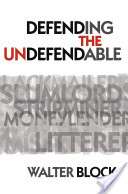Defending the Undefendable
Defending the Undefendable is a 1976 book by American economist Walter Block.[1] It has been translated into ten foreign languages.[2] The book advances the thesis that various people are stigmatized for engaging in acts that are often illegal or disreputable yet do not involve violence or violation of property. Block further proposes these people may in fact benefit society. Each chapter examines a different type of person, including prostitutes, blackmailers, misers and litterers.
 | |
| Author | Walter Block |
|---|---|
| Country | United States |
| Language | English |
| Subject | Moral philosophy, political economy |
| Publisher | Fleet Press |
Publication date | 1976; 2008 Mises Institute edition |
| Media type | Print (Paperback) |
| Pages | 256 |
| ISBN | 9781933550176 |
| OCLC | 248638106 |
| 973.925 | |
| LC Class | HB95 .B58 |
The original edition had illustrations from Charles Rodrigues.
Reception
Cable news pundit John Stossel said of it, "Defending the Undefendable... opened my eyes to the beauties of libertarianism. It explains that so much of what is assumed to be evil – is not."[3] In 2011, writing that economics "illuminates what common sense overlooks", Stossel called the book "eye-opening" and detailed its contents.[4]
Economist Murray Rothbard thought that by emphasizing marginal scenarios, Defending the Undefendable "does far more to demonstrate the workability and morality of the free market than a dozen sober tomes on more respectable industries and activities. By testing and proving the extreme cases, he all the more illustrates and vindicates the theory.[5]
The philosopher Tibor Machan, who generally shared Block's libertarian leanings, wrote that the book "defends some of the silliest ideas in support of an essentially good cause... He raises some stimulating issues, even if in an intellectually inadequate fashion."[6]
References
- Walter Block, Defending the Undefendable book reprint, Ludwig von Mises Institute, 2008 version.
- Walter Block faculty page Archived 2013-11-23 at the Wayback Machine, Loyola University New Orleans, accessed July 31, 2013.
- American Spectator, December, 2006, p. 37.
- John Stossel, Almost Everything We're Taught Is Wrong, Using economics to explode fallacies, Reason, August 25, 2011.
- https://mises.org/library/defending-undefendable
- https://mises.org/library/defending-undefendable
External links
- Defending the Undefendable. Online edition, by Ludwig von Mises Institute
- LCCN 74-21359